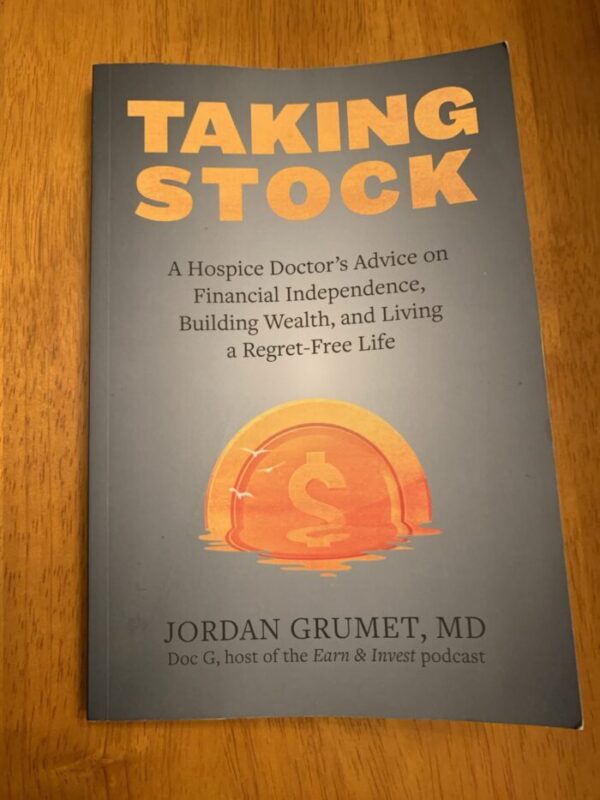The Doctor and the Book
When I first heard about Taking Stock by Dr. Jordan Grumet, I knew that it would be a well thought out book. Dr. Grumet (Doc G) is the host of the Earn & Invest podcast and a regular contributor to the Stacking Benjamin’s podcast. His open ended interviewing style pulls out great insights from guests, beyond the surface level numbers of finance.
In addition to creating in the personal finance world, Doc G is a hospice doctor. Certainly, that work contributes to his world view on all things, including money.
Doc G covers all his bases from what money is, to what money is for. Then he dives into investing and goes deep to ask “Where do I need to invest to improve my life (and the end of it)?”.
Unlike what is expected from a financial book, Taking Stock doesn’t tell you just how to get more money in life. It tells you how to get more life out of your money.
What is Money?
We all handle money in some form every day, but do we ever think about what it really is?
Here is a simile Doc G uses in the book: “Money is like oxygen”.
Without this stuff, it is all you can think about. Too much of it is unhelpful at best and possibly toxic.
I think this is a great analogy to use in defense of giving to the poor – now, not later. Who wouldn’t spare a percent of oxygen if they’re breathing 30% O2 and their neighbor only has 5%.
What is Money For?
“Money was meant to be used”
Pg. 59 – Taking Stock, Jordan Grumet, MD
This simple phrase jumped out at me.
The quote seems obvious, but we can mess this one up when we don’t have clear goals. Money is not meant to be an end, but rather is a place holder for a good or service you need or will need down the road.
In Taking Stock, Doc G explores the means between the extremes of YOLO (You Only Live Once) and Opportunity Cost Fallacy – spending it all today vs. hanging onto money as an end. As I would put it, he explores the virtue between these excesses. But where is that virtuous middle for you?
How much we should spend and when we should spend it depends on several factors. One of those is how long we are alive. We can’t always plan this, but who would you rather be? The man who saved up for peace of mind but died early or the man who lived like he was dying to run out and have to sacrifice for years of old age?
Where Should I Invest?
Money is also for investing; however, not always in the way you would imagine. Doc G provides (or prescribes?) a list of several things to invest in. This is not a list of funds.
While stocks have a place, his primary goal is to focus investing in three things: purpose, identity, and connection.
In a past article, I have discussed “Relationship, Identity, Mission” or RIM. Doc’s proposal is similar, but I liked challenging myself to work backwards from the purpose or mission.
I used to think that our relationships were given, and almost out of our control. Then, given the relationships you can get your identity, and lead to your mission. This still holds true, because some relationships are given – probably the most important ones – yet there is a lot of wiggle room in our chosen friendships and communities that will impact our lives.
The paradigm shift with purpose, identity, and connection, led me to realize that I can control who and what connections I invest my time in. Are we investing in the relationships that will help us to be who we want to be? Will they help us fulfill our purpose?
Taking Stock: Going Deeper and Reflecting
Finally, an added bonus to Doc G’s work in Taking Stock is the guided reflection questions at the end of each chapter. These prompts are things that you can sit with and meditate with to really dive deep. For those of faith, each of these reflections could even be brought to your prayer time. My wife and I did the last reflection together on our “Non-monetary Investment Inventory” which led to a great discussion. It led us to reflect on the things we have to be thankful for that have real value: our education, our experiences, and our relationships.
Overall I loved that this book, unlike your typical hard science books, dove into the deeper meaningful subjects with nuanced views, recognizing that we are not all the same. Everyone has something to take away here.
This is a book that I am sure that I will revisit every once in a while to remind myself to focus on what is important.
St. Joseph, patron saint of a happy death, pray for us!
For a video promo of the book, watch here!



